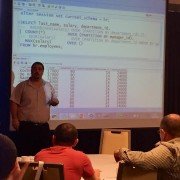Automatic Startup for Oracle on Linux
A few years back, I worked with a junior DBA who was asked to create a new instance on a brand new machine. He created the instance using DBCA and everything went smoothly – or so he thought. A few weeks later, after the system became production, a planned maintenance rebooted that Linux server, and once the machine came back up – the database and listener processes were nowhere to be found.
So that junior DBA, stressed because he thought the database was lost called me in the middle of the night. My first sleepy question for him was “did you even start the database?” and his panicked reply was “of course not – it should be done automatically, I used DBCA!”…
Well, one of the things new DBA’s find hard to realize is that after installing and creating a database (even if we’re using DBCA), it will not start automatically. I’ve seen too many new DBA’s being puzzled by the logic behind automatic startup of Oracle databases on Linux (and UNIX in general) than I care to admit so I decided to put it here for their reference…
In this article I will describe the building blocks for automatic startup, and in my next post I will show the Linux commands needed to put everything together.



